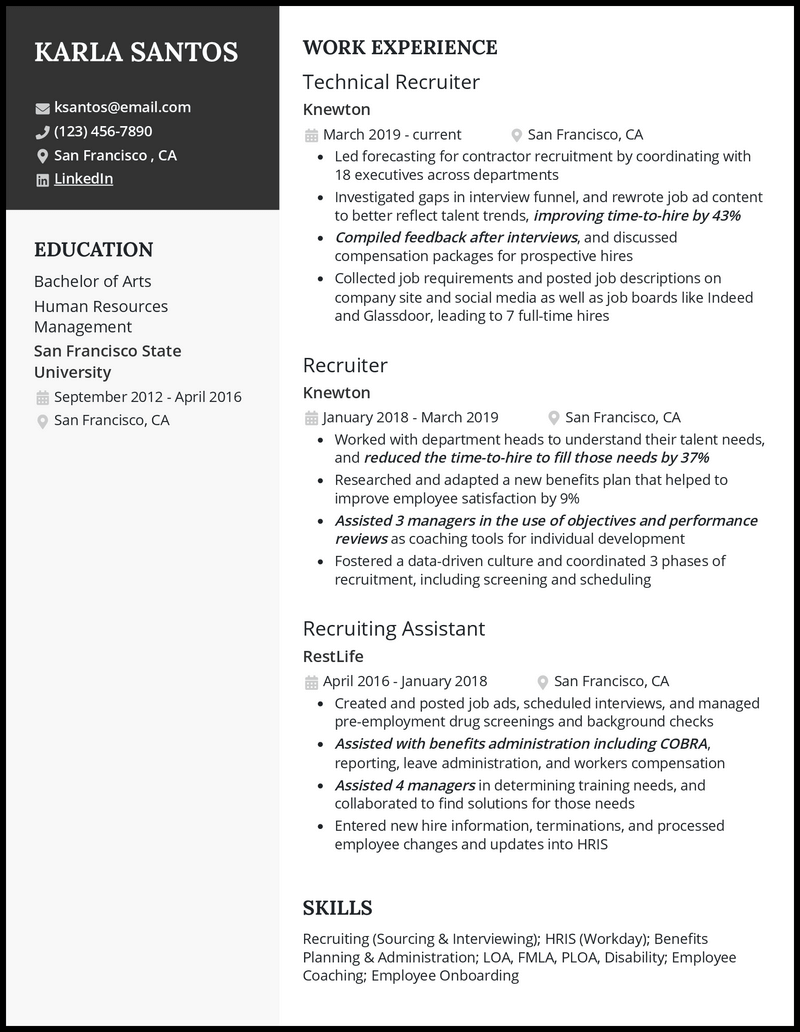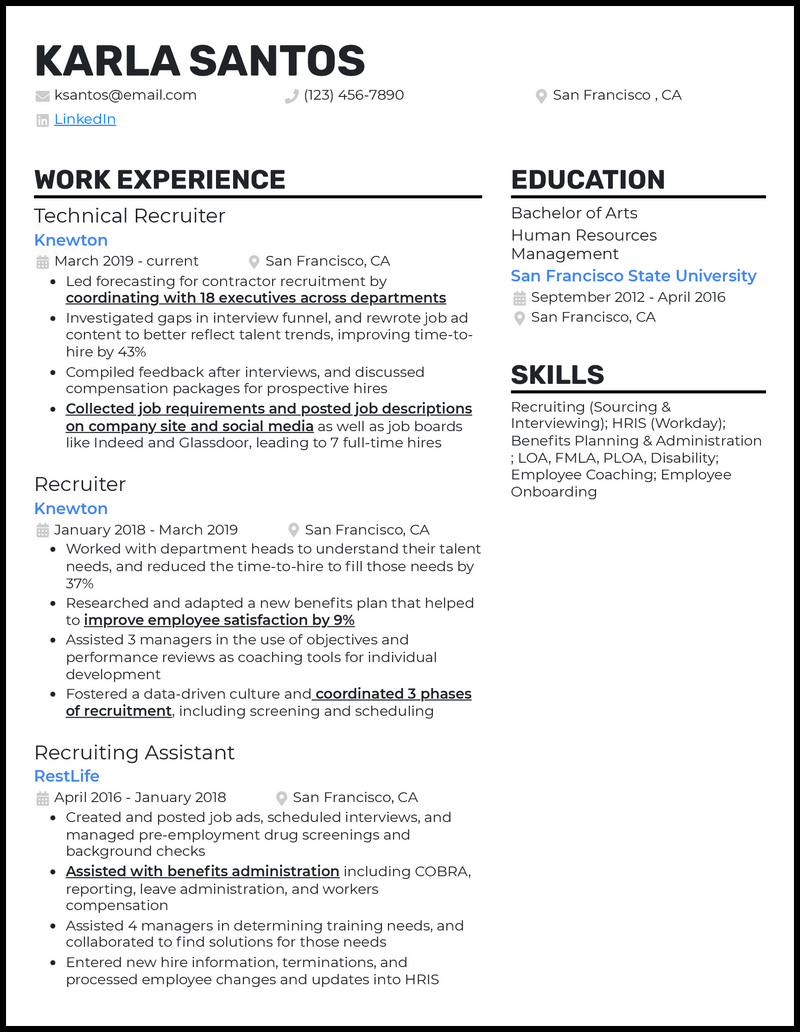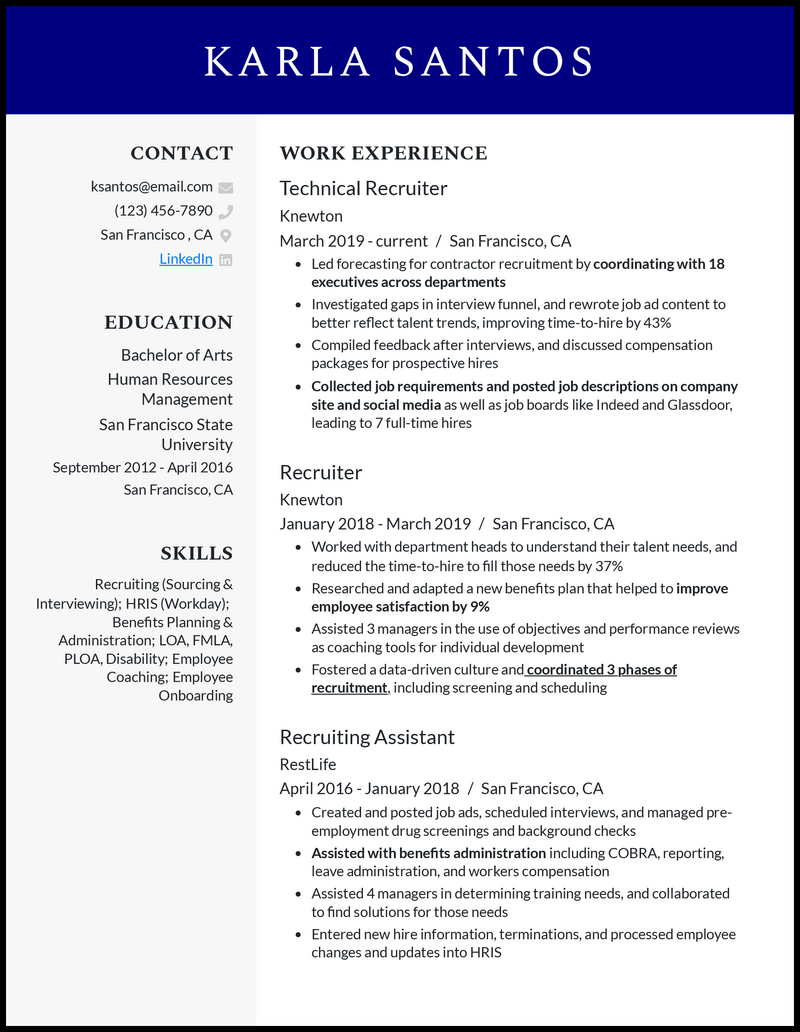By maintaining a collaborative partnership with the company software engineering team and calling upon your own tech industry background, you’re able to zero in on the best candidates for tech roles. You source and interview the most tech-savvy candidates, eventually handling onboarding and documentation as well.
But before you turn in your letter of resignation and set your sights on a new gig, you might still have a few questions about your own resume. What should it look like when you’ve finished highlighting your expertise with policies and employee orientations?
We’ve got this one, no problem: After years of experience in helping technical recruiters like you, we’ve got three resume templates and cover letter writing tips to help you out!
Related resume examples
What Matters Most: Your Skills & Professional Experience

Your skills need to be as well-rounded as you are—and that needs to be immediately apparent to any recruiter who picks up your resume. You need to share your soft skills, but also work in some programs and software tools that show your background expertise.
And you need to be specific about those tools! Name programs like Redis or MongoDB instead of making any sweeping statements like “database software.” Make sure you also present your soft skills with a technical voice by specifying how you interact in job-specific situations.
Clarify that you negotiate, interview, and onboard. And let recruiters know what technical tricks you use to get things done! Here are some examples:
9 most popular technical recruiter skills
- Sourcing
- Interviewing
- HRIS (Workday)
- Benefits Planning
- Staff Administration
- Policy Compliance
- Regulation Screening
- MS PowerPoint
- MongoDB
Sample technical recruiter work experience bullet points
Your job history applies to your resume in a unique way since your role requires a lineup of both technical and interpersonal experiences. You want to show that you know your technical stuff to easily find candidates who have the proper database of hard knowledge—but you should show that you’re great at things like training and onboarding too.
Go for a well-rounded set of experience points. Even if a past job role doesn’t directly relate to technical recruiting, look for overlapping areas such as negotiation, staff training, cross-departmental coordination, and more.
And always provide metrics of your success! Use numerical data to provide quantifiable measurements of your positive impact with satisfaction boosts and increased efficiency rates.
Here are some samples:
- Researched and adapted a new benefits plan that improved employee satisfaction by 9%
- Fostered a data-driven culture and coordinated 3 phases of recruitment, including screening and scheduling, to improve hiring efficiency by 14%
- Created and posted job ads, scheduled interviews, and manage pre-employment drug screenings and background checks to reduce time-to-hire by 11%
- Investigated gaps in the interview funnel, rewriting job ad content to better reflect talent trends and reducing manual hiring efforts by 9 hours weekly
- Worked with department heads to understand their talent needs, reducing niche time-to-hire by 37%
Top 5 Tips for Your Technical Recruiter Resume
- Use industry-specific terms
- Whenever you can, locate opportunities to use field-specific terminology and show that you’re well-versed in the industry. Recruiters who are reading your resume will know what you’re talking about, so don’t shy away from a bit of tech jargon that’s also reflected in the job description.
- Go minimalist
- With your resume template pick, at least. Ultimately, you’ll want the one that makes your experiences with policy development and work culture improvement the focal point while looking sleek and practical.
- Avoid redundant objective statements
- And you may not need a resume summary, either. Let your technical recruiting qualifications speak for themselves: Don’t be afraid to forgo the objective to leave a little breathing room on your resume if benefits planning and employee screening stand strong on their own.
- Don’t get too colorful
- This sort of goes hand-in-hand with the minimalist look of your resume: If you use any color, make sure it’s understated and just use it in a couple of places, such as your name and section headers. Prioritize reader-friendliness, just as you would with a fresh workplace policy.
- Show your versatility
- You’ve heard it already—we know! But it really is important to demonstrate that you can handle a broad range of skills, situations, and challenges. No two hiring processes work the same way, as you probably know, so use a variety of examples to show that you’re ready for anything as a technical recruiter.
Get super specific with your examples and metrics. Additionally, make your bullet points increasingly complex as they become more recent to show that you’ve advanced within your technical recruiting role.
One page only. Preferably even a bit less. You want to demonstrate quality over quantity while you lay your qualifications on the table. Give recruiters an easy snapshot of your abilities, not a whole orientation packet!
The best resumes will use context for the bullet points in the job history to show off how well you’ve adapted to various technical workplace settings and surpassed a variety of goalposts. Context can help make your metrics look snazzier, too!








